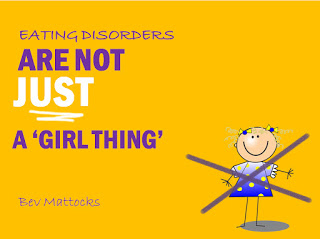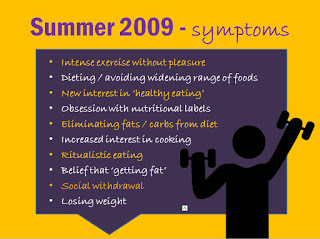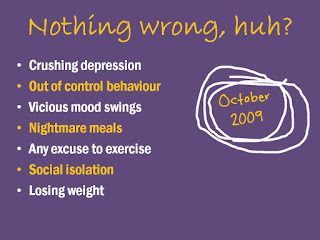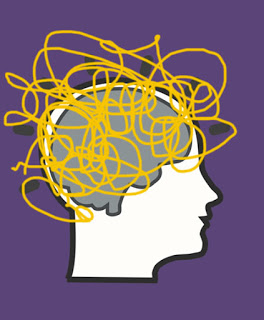On Saturday afternoon I spoke at the SEDIG (Scottish Eating Disorders Interest Group) conference in Edinburgh about my family’s experience of getting my son through anorexia. It was great to see so many dedicated people together from across Scotland – mainly parents who are still struggling with an eating disorder in the family but also one or two clinicians, and the speakers, chaired by the amazing Dr Jane Morris, Consultant Psychiatrist, Eden Unit, Aberdeen.Everyone who spoke at the conference is doing an incredible job to raise awareness of the issue of eating disorders – and in the afternoon the focus was primarily on eating disorders in males, so it was great to see Sam Thomas from Men Get Eating Disorders Too and Paul Donald from Men …
Part #1 of my talk: "Eating disorders are not just a ‘girl thing’"
It all started in the spring of 2009 when our son Ben was 15. He’d been quite chubby at primary school and had been bullied as a result.But at secondary school he got into rugby and developed a new leaner, more muscly physique which he was very proud of.And because he was the “guy in the rugby team” he was very popular – he had a great group of friends. So during those first two years at secondary school things were going from strength to strength. Life was pretty normal.But by early 2009 Ben was getting fed up with rugby. However he was worried that if he stopped, he’d get fat again, lose his new physique and stop being popular. He was worried that he would be …
Part #2 of my talk: "Eating disorders are not just a ‘girl thing’"
Things began to get more obvious over the school summer holidays when Ben was at home and we were with him more.By this time he was exercising like crazy, every day. He joined our local gym and would run there and back as well as doing all the usual situps, etc.He developed a big interest in cooking and especially healthy cooking. He’d slim down recipes, cutting out all the fats and carbohydrates and make some quite weird concoctions that tasted pretty disgusting.He was also isolating himself. I don’t think he saw any of his friends throughout the entire summer holidays which was unusual for him.He was getting snappy and miserable, and not very nice to be around. And of course because he was …
Part #3 of my talk: "Eating disorders are not just a ‘girl thing’"
Throughout October we went to and fro to the GPs only to be told the same old thing: go home, eat more and come back in a couple of weeks.Meanwhile all the warning signs were getting stronger by the day. Mealtimes were becoming difficult; everything had to be perfect, weighed out to the nearest nanogram to make sure he wasn’t getting “too much”.Ben began to police my cooking in the kitchen and change recipes, striking through any “offending” recipes with a marker pen, and he would blow a fuse at the slightest thing.Meanwhile he was exercising like crazy – rugby, cross-country, yoga, situps, press ups and so on. He became obsessed with getting a six pack because he was convinced that his best …
A quick break from the talk transcripts…
After my SEDIG (Scottish Eating Disorders Interest Group) conference talk on Saturday about eating disorders in boys, one mum in the audience stood up. She said: “You’ve just told our story – it’s identical. Except for one thing. Unlike your son, ours didn’t make it; he passed away, aged 19.” My jaw dropped. And with it came a rush of emotion. Here was I, describing our recovery story. There she was, reinforcing the fact that eating disorders can kill. They are deadly diseases. And no matter how punishingly hard you work as a parent to get your child through it, the eating disorder can claim them in the end.I know some of us felt some guilt. Like survivors’ guilt, I guess. Our sons and daughters pulled through; …
Part #4 of my talk: "Eating disorders are not just a ‘girl thing’"
So… Just to summarise so far… My 15-year-old son Ben developed anorexia over the summer of 2009. In the September I took him to the GP but it was the end of October before a referral was sent off to CAMHS (the UK-based Child and Adolescent Mental Health Services). It took a further month before I heard back from CAMHS only to be told that it could be 18 to 22 weeks before he was seen, which would take it up to around Easter time. I was told there was nothing they could do to speed things up and we would just have to wait our turn…By this point, Ben was heading downhill at a rate of knots – like a nightmarish rollercoaster. We didn’t recognise our …
What do my elbow, back and my brain have in common?
Back in August I had a bike accident. I broke my elbow and herniated a disk in my lower spine. Meanwhile I was onto my fourth (or was it my fifth?) course of therapy for the PTSD, anxiety and depression I’d developed two-and-a-half years before – a delayed result of my brain attempting to cope with what it had been through during the years when I battled to get my teenage son through anorexia.It took around 12 weeks for my elbow fracture to heal. Eight months on I am still working on the tail-end of the disk herniation, very gradually easing myself back into normal tasks and even sport (I can’t wait to get back on my bike, for example, but will need …
Big flashbacks at teatime….
It’s curious how the brain gets ‘stuck’ in the ‘fight or flight’/Red Alert response, isn’t it? Take yesterday teatime for example (or evening meal, to non-Yorkshire people out there!) Paul and Ben were eating fish in breadcrumbs, chips and mushy peas. Ben commented on the fact that Sainsbury’s mushy peas weren’t a patch on Batchelor’s mushy peas. Then there was a silence. And the ‘stuck’ part of my brain suddenly went into FREEZE. I mean F.R.E.E.Z.E…Why? Because in the ‘bad old days’ when Ben’s anorexia was raging, he’d make a comment on something about the food not being right (too hot, too cold, too tasteless, too fatty, too little, too much, too dry, too salty, too… you name …
One good thing that came out of his eating disorder
My son is currently writing his university degree dissertation and studying for his final exams at the same time as applying for a Masters degree and obtaining funding for it. Phew! But I have to say – his time management skills are awesome, they really are. Top notch. Helped, of course, by the fact that he’s passionate about his subject: history. While other students leave things to the last minute and panic, the wheels of his time management ability are turning smoothly and on time. I am so very proud of him – and admire his dedication and organisational skills more than you could imagine!Much of this ability comes from the months when he was off school, in his GCSE year (2010). Work was sent home from …
This’ll make you giggle
I just said to him: “I’m so proud of you, all these time-management skills and all that.” “What’s brought that on?” he said, suspiciously. So I told him I’d blogged about it and so on. “Aw, thank you!” he said. Then, giggling (in a little boy’s voice): “Okay, mummykins… I’ve been such a good little boy, can I have a million pounds, please? Like NOW! In CASH!!”That’s another bonus. He’s got his fabulous sense of humour back, too.
Scientists think anorexia could be caused by a bacterial infection – ScienceAlert
ScienceAlertScientists think anorexia could be caused by a bacterial infectionScienceAlertAnorexia has the highest mortality rate of any mental illness, and yet we still know frustratingly little about what triggers the condition, and how to successfully treat it. But scientists now think that might be because we've been looking in the …Do anorexia, irritable bowel syndrome, chronic fatigues share a common cause?Science DailyEating Disorder Anorexia May Be Caused By BacteriaTech TimesAnorexia Tied Up With Bacterial InfectionsCounsel & HealMD Magazine -6minutesall 11 news articles »
Overcoming Anorexia Nervosa: ‘That moment broke me down and I told my mum what had happened to me when I was … – Irish Independent
Irish IndependentOvercoming Anorexia Nervosa: 'That moment broke me down and I told my mum what had happened to me when I was …Irish IndependentWhile in hospital, Donna was put beside a girl who was also anorexic and had a lower weight, which made her want to push herself to become even lighter. She achieved this by hiding food under the mattress and behind the radiator. "I think it's the …and more »






